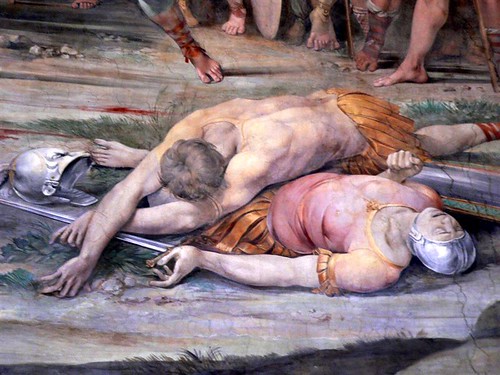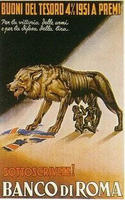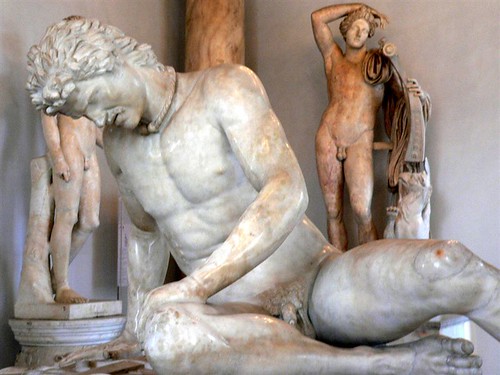

Sunday, March 13, 2005: " Although the not-so-mythical founder of Rome (Romulus) built his first stronghold on the Palatine hill, the Capitoline was long the defensive center of Rome. It was the highest and rockiest hill in Rome, being bordered on all sides by sharp cliffs. In fact, the western side was known as the Tarpeian Rock, off of which criminals were thrown to supplement crucifixion and burning at the stake in the Romans' repertoire of means of capital punishment. Access to the Capitoline was only by means of a narrow path leading up the southern side of the hill. This was easy to defend in the event of an attack. Even at the height of Rome's power, the Capitoline was still considered the citadel of the city, and citizens could flee there in case the city's walls were breached by an invading army. So, this massive, fortified hill towered over the city, and still does today." - Capitoline by W. Logan.
 rennovation) so I took hundreds of pictures as you can imagine. I got some nice photos of the murals depicting the founding of Rome although it was a challenge since flash photography is not allowed and I'm a bit short so the angle creates some distortion. I was only barked at twice by one of the female guards. Once because I was trying to steady my camera by leaning against a wall (Pat, my volunteer human tripod, had taken a break) and once because she thought I might be shooting video which is also forbidden.
rennovation) so I took hundreds of pictures as you can imagine. I got some nice photos of the murals depicting the founding of Rome although it was a challenge since flash photography is not allowed and I'm a bit short so the angle creates some distortion. I was only barked at twice by one of the female guards. Once because I was trying to steady my camera by leaning against a wall (Pat, my volunteer human tripod, had taken a break) and once because she thought I might be shooting video which is also forbidden.
Of course I took pictures of the Capitoline Wolf from all different angles. The Capitoline Wolf, the ancient symbol of the city of Rome, is probably one of the most immediately recognized statues of the ancient world. The bronze wolf is thought to be of Etruscan origin dating from the 5th century BCE. The suckling children were added during the Renaissance. Most people are familiar with the legend of Romulus and Remus. Although the Renaissance additions depict chubby apparently happy children, as young men, the two brothers did not get along nearly as well. In an argument over the site of their newly proposed city, Romulus killed Remus. So the eternal city ended up with the name of Rome (not Reme). Romulus ruled for 38 years then legend says that he was taken up to heaven by a violent whirlwind:
"Romulus's end, in the 38th year of his reign, was a supernatural disappearance, if he was not slain by the Senate. Plutarch (Life of Numa Pompilius) tells the legend with a note of skepticism:
- "It was the thirty-seventh year, counted from the foundation of Rome, when Romulus, then reigning, did, on the fifth day of the month of July, called the Caprotine Nones, offer a public sacrifice at the Goat's Marsh, in presence of the senate and people of Rome. Suddenly the sky was darkened, a thick cloud of storm and rain settled on the earth; the common people fled in affright, and were dispersed; and in this whirlwind Romulus disappeared, his body being never found either living or dead. A foul suspicion presently attached to the patricians, and rumors were current among the people as if that they, weary of kingly government, and exasperated of late by the imperious deportment of Romulus towards them, had plotted against his life and made him away, that so they might assume the authority and government into their own hands. This suspicion they sought to turn aside by decreeing divine honors to Romulus, as to one not dead but translated to a higher condition. And Proculus, a man of note, took oath that he saw Romulus caught up into heaven in his arms and vestments, and heard him, as he ascended, cry out that they should hereafter style him by the name of Quirinus."
"Then a few voices began to proclaim Romulus's divinity; the cry was taken up, and at last every man present hailed him as a god and son of a god, and prayed to him to be for ever gracious and to protect his children. However, even on this great occasion there were, I believe, a few dissentients who secretly maintained that the king had been torn to pieces by the senators. At all events the story got about, though in veiled terms; but it was not important, as awe, and admiration for Romulus's greatness, set the seal upon the other version of his end, which was, moreover, given further credit by the timely action of a certain Julius Proculus, a man, we are told, honored for his wise counsel on weighty matters. The loss of the king had left the people in an uneasy mood and suspicious of the senators, and Proculus, aware of the prevalent temper, conceived the shrewd idea of addressing the Assembly. Romulus, he declared, the father of our City descended from heaven at dawn this morning and appeared to me. In awe and reverence I stood before him, praying for permission to look upon his face without sin. "Go," he said, "and tell the Romans that by heaven's will my Rome shall be capital of the world. Let them learn to be soldiers. Let them know, and teach their children, that no power on earth can stand against Roman arms. Having spoken these words, he was taken up again into the sky. " (Livy, 1.16, trans. A. de Selincourt, The Early History of Rome, 34-35) [1] (http://rel2243-04.fa03.fsu.edu/divine.htm)"

I found a nicely detailed figurine of the wolf with suckling Romulus and Remus the next day at a shop outside the Vatican for a very reasonable price. It resides in a place of honor on my bookshelf in my office. I thought this picture of a WWII poster showing a much less maternal wolf was quite interesting. Notice the target of the wolf's wrath. It apparently was used for recruiting purposes by Mussolini's regime.
I also made a special effort to be sure to seek out the bust of Brutus. Brutus is of course Lucius Junius Brutus, often referred to as the founder of the Roman Republic, who lived in the 6th century BCE not Marcus Junius
 Brutus, one of the conspirators that assassinated Caesar. According to Livy,
Brutus, one of the conspirators that assassinated Caesar. According to Livy,"Brutus was the most important personality of the patrician "revolution" which overthrew monarchic rule in Rome and instituted the Republic. Brutus was the son of Marcus Junius and of a sister of Tarquinius Superbus. When he was still a child, he saw his father and brothers being executed by the tyrant and escaped solely by feigning mental insanity (the origin of his cognomen Brutus). Saved by such deceit, he was regarded with disdain, being kept in the palace as a laughing stock. He grew up in the royal entourage, waiting for the right moment for vengeance.
During a plague which almost overwhelmed Rome, Tarquin's sons were sent to Delphi in order to consult the oracle and they took Brutus along, obviously to amuse themselves and forget about the boredom and the smaller inconveniences of the trip. Brutus brught as an offering to the god Apollo a coarse stick. But Brutus had hidden a golden sceptre inside the stick. Apollo's pythia predicted the god would give the empire of Rome to the one who would first embrace his mother after their return.
Brutus, perceiving the true meaning of the pythia's prophecy, kissed the land, the mother of mankind, of his ancestors immediately after entering Rome.
However, Brutus did not need to feign imbecility for much longer, because the ill-fated rape and murder of Lucretia by Sextus Tarquinius, one of the king's sons, gave him the pretext he needed to act. He grew enraged when confronted with the dead body of this heroine, seized the iron stick which had served as the murder weapon against her chaste resistance and swore to kill all the Tarquins, who were deeply unpopular in Rome, if not odious. Brutus ran to the Forum, called the people to listen to his speech (it was his legal right as tribune of the Celers, and the king was abroad) and proclaimed the abolishment of the Roman Monarchy and the enactment of the exile of the Tarquins.
The royal family quickly returned to the city in order to deal with the rebel - to them, he was little more than a usurper. They didn't understand their lack of popularity and this sudden change in their fool's personality, believing he was perhaps controlled by the senatorial magistrates. The Tarquins attempted to take the city by surprise but were abandoned by their soldiers. Rome was a republic - res publica." - Controversial Personalities of the Roman Republic by 'Andraeus Papadopolus Dacicus Maximus'
 Of course as a big fan of the film "Gladiator" and actor Joaquin Phoenix, I had to search out the famous statue of Commodus dressed as Hercules in the robe of the Nemean lion.
Of course as a big fan of the film "Gladiator" and actor Joaquin Phoenix, I had to search out the famous statue of Commodus dressed as Hercules in the robe of the Nemean lion."Commodus began to dress like the god Hercules, wearing lion skins and carrying a club. Thus he appropriated the Antonines' traditional identification with Hercules, but even more aggressively. Commodus' complete identification with Hercules can be seen as an attempt to solidify his claim as new founder of Rome, which he now called the Colonia Lucia Annia Commodiana. This was legitimized by his direct link to Hercules, son of Father Jupiter. He probably took the title of Hercules officially some time before mid-September 192.
While the literary sources, especially Dio, Herodian, and the Historia Augusta, all ridicule the antics of his later career, they also give important insight into Commodus' relationship to the people. His most important maneuver to solidify his claims as Hercules Romanus was to show himself as the god to the Roman people by taking part in spectacles in the amphitheater. Not only would Commodus fight and defeat the most skilled gladiators, he would also test his talents by encountering the most ferocious of the beasts. Commodus won all of his bouts against the gladiators. The slayer of wild beasts, Hercules, was the mythical symbol of Commodus' rule, as protector of the Empire.
During his final years he declared that his age should be called the "Golden Age." He wanted all to revel in peace and happiness in his age of glory, praise the felicitas Commodi, the glorious libertas, his pietas, providentia, his victoria and virtus aeterna. Commodus wanted there to be no doubt that this "Golden Age" had been achieved through his munificence as Nobilissimus Princeps. He had declared a brand new day in Rome, founding it anew in 190, declaring himself the new Romulus. Rome was now to be called Colonia Lucia Annia Commodiana, as noted above, and deemed "the Immortal," "the Fortunate," "the Universal Colony of the Earth." Coins represent the archaic rituals of city-[re]foundation, identifying Commodus as a new founder and his age as new days.
Also in 190 he renamed all the months to correspond exactly with his titles. From January, they run as follows: Lucius, Aelius, Aurelius, Commodus, Augustus, Herculeus, Romanus, Exsuperatorius, Amazonius, Invictus, Felix, Pius. According to Dio Cassius, the changing of the names of the months was all part of Commodus' megalomania. Commodus was the first and last in the Antonine dynasty to change the names of the months.The legions were renamed Commodianae, the fleet which imported grain from Africa was called Alexandria Commodiana Togata, the Senate was deemed the Commodian Fortunate Senate, his palace and the Roman people were all given the name Commodianus. The day that these new names were announced was also given a new title: Dies Commodianus. Indeed, the emperor presented himself with growing vigor as the center of Roman life and the fountainhead of religion. New expressions of old religious thought and new cults previously restricted to private worship invade the highest level of imperial power.
If Eusebius of Caesarea is to be believed, the reign of Commodus inaugurated a period of numerous conversions to Christianity. Commodus did not pursue his father's prohibitions against the Christians, although he did not actually change their legal position. Rather, he relaxed persecutions, after minor efforts early in his reign. Tradition credits Commodus's policy to the influence of his concubine Marcia; she was probably his favorite, but it is not clear that she was a Christian. More likely, Commodus preferred to neglect the sect, so that persecutions would not detract from his claims to be leading the Empire through a "Golden Age."
During his reign several attempts were made on Commodus' life. After a few botched efforts, an orchestrated plot was carried out early in December 192, apparently including his mistress Marcia. On 31 December an athlete named Narcissus strangled him in his bath, and the emperor's memory was cursed. This brought an end to the Antonine Dynasty. - Commodus by Dennis Quinn

The original of the Dying Gaul, another well known statue, is also in The Capitoline Museum. Although this statue depicts a Gaul with a Romanized short haircut, it may actually be more accurate than the monument erected to Vercingetorix with his long flowing hair. Many Gallic, Germanic, and Batavian chieftains that led revolts against the Roman domination of Gaul and Germania were Romanized to a large degree, having served as commanders of Roman Auxilliaries.
 We met another lady traveling by herself from Australia and she joined our adventure today. She and I took the time to go into the King Victor Emmanuel monument and I managed to photograph some murals and sculptures inside as well as take some close up photos of the tomb of the unknown warrior and the honor guard. I also got some more pictures of Trajan's forum and a few more of Trajan's column.
We met another lady traveling by herself from Australia and she joined our adventure today. She and I took the time to go into the King Victor Emmanuel monument and I managed to photograph some murals and sculptures inside as well as take some close up photos of the tomb of the unknown warrior and the honor guard. I also got some more pictures of Trajan's forum and a few more of Trajan's column.
On the way back to our hotel, the taxi drove by the Circus Maximus so we got to check it off our list too.
No comments:
Post a Comment